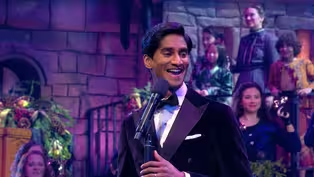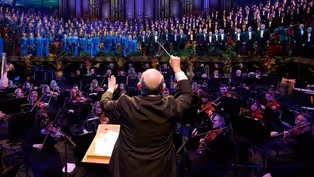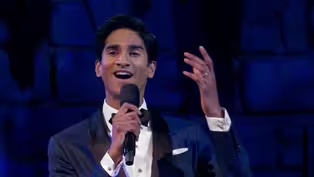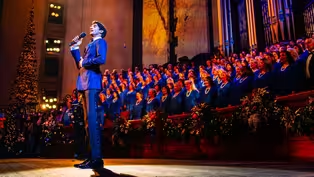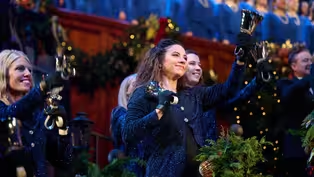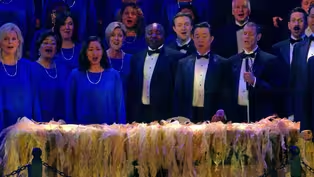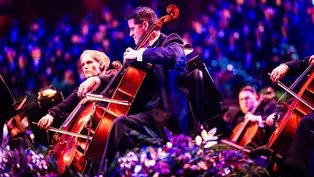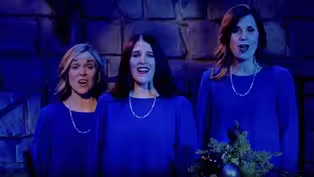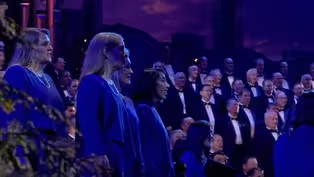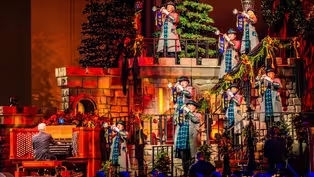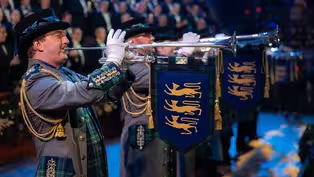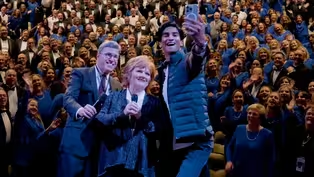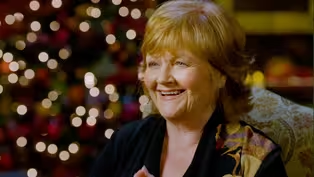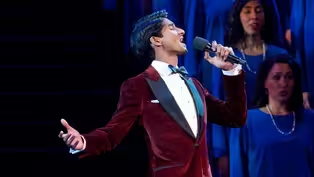
Victor Hugo's Wondrous Feast
Clip: 12/17/2024 | 17m 42sVideo has Closed Captions
Actress Lesley Nicol narrates a heartwarming story about Victor Hugo, author of Les Misérables.
Actress Lesley Nicol narrates the true story of Victor Hugo, author of Les Misérables, and his wife hosting a Christmas feast for impoverished children. Brought to life by actors on stage, this heartwarming story celebrates the transformative power of love and compassion.
Problems playing video? | Closed Captioning Feedback
Problems playing video? | Closed Captioning Feedback
Hope of the Season: Christmas with The Tabernacle Choir, featuring Ruthie Ann Miles and Dennis Haysbert, was made possible in part by Ronald C. & Kaye Gunnel, Charles & Janet...

Victor Hugo's Wondrous Feast
Clip: 12/17/2024 | 17m 42sVideo has Closed Captions
Actress Lesley Nicol narrates the true story of Victor Hugo, author of Les Misérables, and his wife hosting a Christmas feast for impoverished children. Brought to life by actors on stage, this heartwarming story celebrates the transformative power of love and compassion.
Problems playing video? | Closed Captioning Feedback
How to Watch Christmas With The Tabernacle Choir
Christmas With The Tabernacle Choir is available to stream on pbs.org and the free PBS App, available on iPhone, Apple TV, Android TV, Android smartphones, Amazon Fire TV, Amazon Fire Tablet, Roku, Samsung Smart TV, and Vizio.
Providing Support for PBS.org
Learn Moreabout PBS online sponsorship(pensive stirring music) (Victor grunting) - Ooh.
This is Victor Hugo.
In 1817, the prestigious Académie Française, awarded one of his poems honorable mention.
Although the judges could not believe it was written by a 15-year-old boy.
At 16, he was secretly engaged to his childhood friend, Adèle Foucher.
- Victor, everything all right?
(Victor groaning) Dear?
- At 17, he and his brothers published a magazine.
And at the age of 20, he was married and began a family.
Five children in seven years, though one died soon after birth.
Oh, Victor loved his children.
He made them toys, told them stories, and he left little drawings on their pillows.
To his youngest daughter, he once wrote, - Here are two kisses, my Didi.
And a third for your mother.
- [Narrator] And to his son.
- [Victor] I love you.
I love you deeply, my little Toto.
Nothing I see distracts me from you.
- Victor believed that all children come directly from God, and regarded them with reference.
Indeed, children often featured prominently in his books, poems, and plays.
And there were plenty of them.
When he took his last breath at the age of 83, he left behind over 50 published works.
But nothing rivaled what he was writing here in the British Isles, on the isle of Guernsey.
For six years, Victor had overseen the renovation of the only house he ever owned, Hauteville House.
A stately mansion overlooking Saint Peter Port.
Here he lived with Adèle.
- Victor, I'm off to town!
- And three of their grown children.
- Charles, Francois-Victor, Didi?
- What?
- I'm going.
- Go well, ma mère.
Je t'aime.
- Oui, Maman, au revoir.
(pensive stirring music continues) - Atop the opulent drawing rooms and richly-paneled libraries was Victor's lookout.
From there, he could see the bay, Castle Cornet, and the endless sea.
But even with that view to inspire him, the writing was not always easy.
- Mrs. Sixty, refreshment, s'il vous plait.
- Coming.
- [Narrator] Now that is Mrs. Sixty, Hugo's devoted cook.
Her real name was Marie Como, but they called her- - Mrs. Sixty!
Rescue me.
- [Mrs. Sixty] I'm coming.
(church bell tolling) - In town, Mrs. Hugo was used to passing all kinds of people on the street.
But that morning, what she saw touched her deeply.
(lulling somber music) There standing in the sunlight was a five-year-old girl with an even younger child on her hip.
The older one was weeping with the pain of holding a toddler nearly half her size.
The younger one, crying out for her absent mother.
Two little waifs.
No coats, no shoes, and not a soul to look after them.
- Oh, Victor, I cannot get their faces from my mind.
- Well, my dear, the light of conscience is not easily put out.
- I can only imagine our own children standing there all alone, in the street with nothing to eat and nowhere to go.
- So what will you do about it?
- Do?
I don't know.
I don't know what is possible.
- But Adèle could not erase the image of those children from her mind.
Soon, she was writing to newspapers to raise money for a crêche, or as we would say today, daycare.
She also organized a bazaar, but because the amount she collected was not enough, she donated it to Charity.
Meanwhile, Victor was at work on his own project, the novel we know as "Les Miserables".
He too had been influenced by poor children.
The books pages are filled with urchins and beggars.
Brave little Gavroche, the Noble Eponine.
And of course, dear Cosette.
All of them children, all in terrible need.
(pensive delicate music) By the time "Les Miserables" was published in 1862, Victor had become clear in his mind about what he termed the rights of the child.
- Dear.
- [Narrator] Those rights included proper nutrition, as outlined in a medical report that captured Victor's attention.
- Here, Adèle, listen to this, eh?
Many childhood diseases may be prevented, if not overcome, by a monthly meal of fresh meat.
- Oh, interesting.
- Between Adèle's encounter in town, Victor's work on his novel, and their growing desire to help impoverished children, Victor and Adèle were inspired to act.
But not everyone agreed with their plan.
(Adèle clapping) - Attention (speaks foreign language).
Monsieur Hugo and I have determined that Monday next, eight children, some of the poorest on the island, will dine with us here at Hauteville House.
- What?
Mother here, in our home?
I understand showing a little kindness, but inviting them here in our house, where we live?
I can't imagine- - Charles, dear.
Don't think that way.
This is an opportunity to give more than money.
It is to give of ourselves.
- And we have so much to give.
- Oui, oui, fantastic.
- Father, please, I beg you, be reasonable.
Think of the implications.
- And Mrs. Sixty, I want to serve them the finest meat.
- You what?
The children?
- You heard me.
Only the best cuts now.
No scraps.
- Yeah, all right.
- Soon, dinners were being held weekly.
At first, the Hugos invited eight children, along with a few mothers.
Then 15, then 32.
Victor was already devoted to children, but now he was surrounded by them.
- Un, deux, trois.
(children whooping) - Mrs. Sixty, um, a few guidelines.
The table shall be open to all nationalities and denominations, give to all.
And for the vacant places at the meals, admit the poorest children first.
- Yes, I have it.
- And Mrs. Sixty, I want to collect baby linens for the women.
- Baby linens.
Whatever for?
- For the mothers who are great with child.
- Baby linens, as Adèle called them, were actually swaddling clothes.
Because of the Hugos' generosity, hundreds of babies were safely wrapped.
Each one, a reminder of the Christ child.
(delicate music) So when the Hugos announced that they were holding a grand Christmas feast, no one was surprised.
But the feast was not just for children.
Victor also invited journalists, priests, artists, and others of influence from England and France.
(glass clinking) - Dear friends, what we are doing here is, well, all of us have a responsibility to do.
- So, we invite you to join us.
- Indeed, come, help, serve.
- A few looked on cynically, wondering if the Hugos were simply promoting themselves, but the majority felt otherwise and recorded their experiences.
- The children are escorted to the doors by their mothers.
- They enter happily, without shyness, as if it were their own home.
- Yes, yes, and though they are wretched, the Hugos receive them with open arms.
- In the billiard room, gifts of clothing are laid out on the table.
- And they have a Christmas tree decorated with toys and presents just for them.
- Then in a silence that is astonishing considering that there are 40 children, Monsieur Hugo addresses them.
- My dear children, you are my little brothers and sisters in the good Lord.
You do not owe me anything, but you should be grateful to God above, the father of us all.
So if you want to thank somebody for it, it should be Him.
(delicate lulling music) - After the eldest child offered prayer, all partook of Mrs. Sixty's marvelous cooking, gratefully and joyfully.
But they devoured more than food.
They feasted on love.
(lulling music turning dramatic) (choir singing in French) ♪ He is born, the divine Christ child ♪ ♪ Son of God ♪ ♪ He is born, child of light ♪ ♪ Sing his praises Christmas night ♪ - In time, fully one third of the Hugo's weekly household budget was used to pay for the dinners, and everyone in the house was engaged in hosting them.
What inspired this sacrifice?
From his lookout, Victor frequently felt something move him, something beyond himself.
- With all the waves, vast foam, and all the skies, great clouds under my window, my thoughts are loosed by this giant swaying of the infinite.
What is not swayed is my soul face to face with eternity.
My conscience face to face with truth.
- That truth came by way of an inner light.
What Victor knew as his conscience, prompting him to love others.
But for him, love had to be more than warmth of heart.
Three days before he died, he penned these immortal words.
- Aimer c'est agir.
- Aimer c'est agir.
To love is to act.
It is a golden thread running through all Victor's work.
Especially in "Les Miserables".
Many characters love so deeply that they sacrifice to help others, and even save them.
And Jean Valjean, seeking to love everyone, spares his enemy, rescues the boy he once resented, and risks all to bring him home.
For seven more years, week in, week out, children and adults gathered at Hauteville House for dinner and the annual Christmas feast.
They came from varied cultures, religious denominations, and political persuasions.
In response to the Hugos' example, similar efforts were organized in Great Britain, the United States, and many other lands.
All of this was Victor's intention.
- Has not the Lord said, "Suffer the children to come unto me"?
It is my desire that this invitation be universally accepted.
(lulling pensive music) What we are doing is not a, a big thing, it.
It is a weekly meal for needy children.
It is not charity.
It is brotherhood.
It sows seeds of human solidarity.
And it makes peace.
- As Victor hoped, when the children came around his table, they ate as one.
Like shepherds at the manger, they found there was room for everyone.
(choir singing in French ) - To love is to act, Victor Hugo said.
When we do, we are not content to remain at a distance.
We joyfully open our hearts, our hands, and even our homes.
The courage we need to do that comes from the light in the manger.
The child born unto all of us.
Filled with his love, we know each other as the brothers and sisters we are.
In loving, serving, and embracing God's family, we discover the greatest Christmas gift of all.
To see in one another the face of the holy child.
Even the face of God.
(pensive lulling music continues) (children of nations who hunger for peace on earth...) (choir singing) (choir singing) (pensive lulling music continues) (audience applauding)
Angels from the Realms of Glory
Video has Closed Captions
Clip: 12/17/2024 | 4m 36s | Watch Michael Maliakel perform "Angels from the Realms of Glory" with The Tabernacle Choir. (4m 36s)
Video has Closed Captions
Clip: 12/17/2024 | 2m 15s | British actress Lesley Nicol narrates the Nativity, for The Tabernacle Choir Christmas special: Joy. (2m 15s)
An die Freude (Ode to Joy) excerpts from Symphony No. 9
Video has Closed Captions
Clip: 12/17/2024 | 3m 37s | The Tabernacle Choir and Orchestra turn Beethoven’s “Ode to Joy” into a climactic tour de force. (3m 37s)
God Help the Outcasts, (from The Hunchback of Notre Dame)
Video has Closed Captions
Clip: 12/17/2024 | 3m 38s | See Michael Maliakel perform "God Help the Outcasts" with The Tabernacle Choir and Orchestra. (3m 38s)
Video has Closed Captions
Clip: 12/17/2024 | 3m 49s | Watch Broadway star Michael Maliakel perform "I Wonder as I Wander," with The Tabernacle Orchestra. (3m 49s)
Video has Closed Captions
Clip: 12/17/2024 | 2m 9s | Broadway star Michael Maliakel joins The Tabernacle Choir and Orchestra to sing "Joy To The World." (2m 9s)
Video has Closed Captions
Clip: 12/17/2024 | 3m 29s | Watch The Tabernacle Choir and orchestra perform “Noe! Noe!” with the Bells on Temple Square. (3m 29s)
Video has Closed Captions
Clip: 12/17/2024 | 4m 59s | Hear The Tabernacle Choir and Orchestra's interpretation of “O Little One Sweet." (4m 59s)
Clip: 12/17/2024 | 3m 6s | Watch The Tabernacle Orchestra perform "Patapan," an orchestral fantasy arranged by Ryan Murphy. (3m 6s)
Video has Closed Captions
Clip: 12/17/2024 | 2m 59s | Watch as The Tabernacle Choir and Orchestra perform this a Nativity lullaby, "Peace Be Mine." (2m 59s)
Video has Closed Captions
Clip: 12/17/2024 | 6m 16s | This opening number to "Joy: Christmas with the Tabernacle Choir" is nothing short of spectacular! (6m 16s)
Video has Closed Captions
Clip: 12/17/2024 | 2m 39s | The Tabernacle Choir and Orchestra perform “Still, Still, Still,” an arrangement by Mack Wilberg. (2m 39s)
To the Cradle Run (based on “Bring a Torch, Jeanette, Isabella”)
Clip: 12/17/2024 | 3m | Watch Richard Elliott's spirited Christmas fantasia for organ and the Gabriel Trumpet Ensemble. (3m)
Vom Himmel hoch (From Heaven on High)
Video has Closed Captions
Clip: 12/17/2024 | 2m 55s | The Gabriel Trumpet Ensemble joins The Tabernacle Choir and Orchestra for "Vom Himmel hoch." (2m 55s)
Backstage with Michael Maliakel
Video has Closed Captions
Clip: 12/17/2024 | 5m 11s | Go backstage at Christmas with The Tabernacle Choir with Broadway star Michael Maliakel. (5m 11s)
Video has Closed Captions
Clip: 12/17/2024 | 3m 51s | Go behind the scenes of Christmas with The Tabernacle Choir with beloved actress Lesley Nicol. (3m 51s)
Video has Closed Captions
Preview: 10/7/2024 | 2m 2s | Christmas with The Tabernacle Choir featuring Michael Maliakel and Lesley Nicol. (2m 2s)
Providing Support for PBS.org
Learn Moreabout PBS online sponsorship

- Arts and Music
The Best of the Joy of Painting with Bob Ross
A pop icon, Bob Ross offers soothing words of wisdom as he paints captivating landscapes.












Support for PBS provided by:
Hope of the Season: Christmas with The Tabernacle Choir, featuring Ruthie Ann Miles and Dennis Haysbert, was made possible in part by Ronald C. & Kaye Gunnel, Charles & Janet...
